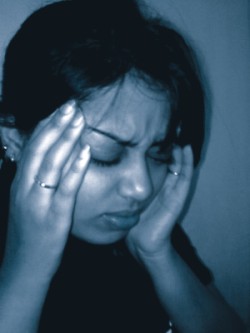|
Health
Tips to Prevent SINUSITIS
 |
| Photo: www.drkunalluthra.com |
With winter on the onset, and visible dust particles flying in air, stuffy nose, headaches, coughs, sneezes are a common scene. Here are some tips to prevent stuffy nose from becoming a sinus infection or help cure a mild sinus infection.
-Use saltwater nasal washes to help keep the nasal passages open and wash out mucus and bacteria. Saline nose drops can be made easily at home: Mix 0.5 tsp (2.5 g) salt and 0.5 tsp (2.5 g) baking soda in 1 cup (237 ml) of body-temperature water (too much salt dries out nasal membranes). Place the solution in a clean bottle with a dropper (available at drugstores). Use as necessary. Make a fresh solution every 3 days. Insert drops while lying on a bed. The person should be on his or her back and hang the head over the side of the bed. This helps the drops get farther back. Try to avoid touching the dropper to the nose, to avoid reinfection. If the bottle does not have a dropper, snuff the solution from the palm of the hand, one nostril at a time.
-It also may help to gargle with warm salt water. [Use 0.5 tsp (2.5 g) salt and 0.5 tsp (2.5 g) baking soda per 1 cup (237 ml) of water.]
-Put moist heat (using a hot, damp towel or gel pack) on your face for 5 to 10 minutes, several times a day.
-Avoid cigarette, cigar, and pipe smoke in your home and workplace. Smoke causes and further irritates inflamed membranes in your nose and sinuses.
-Use over-the-counter medicines such as pain relievers and decongestants (for example, nasal spray) to relieve symptoms. Do not give cough and cold medicines to a child younger than 2 unless your child's doctor has told you to. If your child's doctor tells you to give a medicine, be sure to follow what he or she tells you to do. Be careful when using some nasal-spray decongestants. They usually should not be used for more than about 3 days. Longer use can lead to further swelling of the sinus membranes after the medicine wears off which makes pressure and swelling worse. You may end up dependent on the medicine if you start using more and more of it to get rid of the pressure and swelling.
Even though there is no scientific evidence to prove these things work, the following may help you feel better:
-Avoid breathing dry air. Consider using a humidifier at home and at work to build up the moisture in the air.
-Breathe warm, moist air from a steamy shower, a hot bath, or a sink filled with hot water. You may also try breathing the moist air from a bowl of hot water. Put a towel over your head and the bowl to trap the moist air.
-Drink plenty of liquids to avoid dehydration.
-Exercise regularly.
Symptoms of sinus infection include a feeling of pressure or pain around the eyes or across the cheekbones and a yellow or green discharge from the nose. If symptoms do not get better after a day or two of home treatment or if you develop a fever or ear pain, call your doctor.
Copyright
(R) thedailystar.net 2010
|

